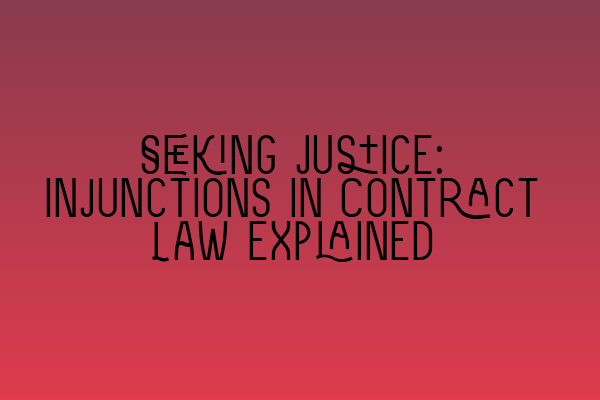Seeking Justice: Injunctions in Contract Law Explained
In the vast and complex world of contract law, sometimes disputes arise that require urgent action to ensure justice is served. It is in these situations that injunctions play a crucial role. In this blog post, we will dive deep into the topic of injunctions in contract law, exploring what they are, how they work, and the various types of injunctions commonly used in legal proceedings.
But before we delve into the specifics, let’s first establish a clear understanding of what an injunction is. In simple terms, an injunction is a court order that compels a person or organization to refrain from performing certain acts or to carry out specific acts. It is a powerful tool designed to prevent harm, preserve rights, and maintain the status quo while a dispute is being resolved.
In the context of contract law, injunctions can be utilized to address a wide range of issues. Let’s take a closer look at some of the most common situations where injunctions come into play.
1. Breach of Contract: In cases where one party breaches the terms of a contract, the other party may seek an injunction to prevent further harm or damages. This is particularly relevant when monetary compensation alone cannot adequately address the harm caused.
2. Specific Performance: Sometimes, monetary compensation is not enough to satisfy the injured party. In such cases, they may seek an injunction ordering the breaching party to fulfill their contractual obligations. This is known as specific performance.
3. Non-Compete Clauses: Non-compete clauses are commonly found in employment contracts and business agreements. These clauses restrict an individual or entity from engaging in certain activities that could be detrimental to the other party’s interests. If a non-compete clause is violated, the affected party can seek an injunction to prevent the breaching party from engaging in the prohibited activities.
4. Confidentiality and Trade Secrets: A breach of confidentiality or misappropriation of trade secrets can have severe consequences for a business. Injunctions can be sought to prevent the dissemination of confidential information or the use of trade secrets by unauthorized third parties.
Now that we have a solid understanding of why and when injunctions are used, let’s explore the different types of injunctions commonly employed in contract law.
1. Prohibitory Injunction: This type of injunction is used to prevent a party from performing a certain act. For example, if one party is unlawfully using copyrighted material owned by another party, a prohibitory injunction may be sought to stop the infringement.
2. Mandatory Injunction: Unlike a prohibitory injunction, a mandatory injunction compels a party to carry out a specific act. For instance, if a party fails to deliver goods as agreed upon in a contract, a mandatory injunction may be sought to force them to fulfill their contractual obligations.
3. Interlocutory Injunction: Interlocutory injunctions are temporary orders issued during the pendency of a legal proceeding. They are usually aimed at preserving the status quo until a final decision is reached. These injunctions are commonly sought when immediate action is required to prevent irreparable harm.
4. Perpetual Injunction: Perpetual injunctions, on the other hand, are final orders that continue indefinitely, typically preventing a party from engaging in a particular act or enforcing a particular right. These injunctions are often issued at the conclusion of a legal proceeding.
It is essential to note that injunctions are not granted automatically. The party seeking an injunction must demonstrate that they have a strong case and that the potential harm they face outweighs any potential harm faced by the opposing party if the injunction is granted. Additionally, the applicant must show that damages alone would not be a sufficient remedy.
In conclusion, injunctions in contract law can be powerful tools used to seek justice and prevent irreparable harm. Whether it is a breach of contract, violation of non-compete clauses, or misappropriation of trade secrets, injunctions play a vital role in preserving the rights and interests of parties involved in contractual disputes.
If you have found this blog post informative, you may also be interested in reading some of our related articles:
– Mentorship for Aspiring Solicitors: Nurturing Talent in the Legal Field
– Legal Challenges and Pitfalls: Navigating the Complexities of the Legal System
– Demystifying the Solicitors Qualifying Examination (SQE): What You Need to Know
– Recognizing Excellence: Law Industry Awards and Accolades
– Mentorship for Aspiring Solicitors: Finding Guidance on Your Legal Journey
These articles explore various aspects of the legal field and can provide valuable insights for aspiring solicitors and anyone navigating the complexities of the legal system.
At SQE Contract Law, we strive to provide comprehensive information on all aspects of contract law to empower individuals and businesses with the knowledge they need to seek justice and protect their interests. Stay tuned for more informative blog posts and feel free to reach out to us if you have any questions or require legal assistance in the field of contract law.
